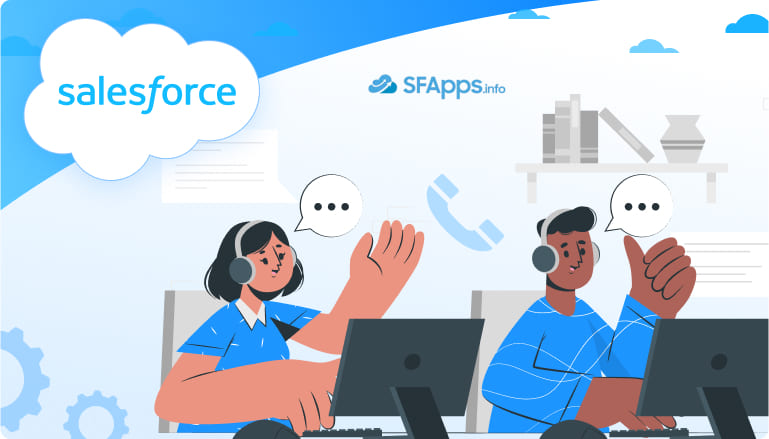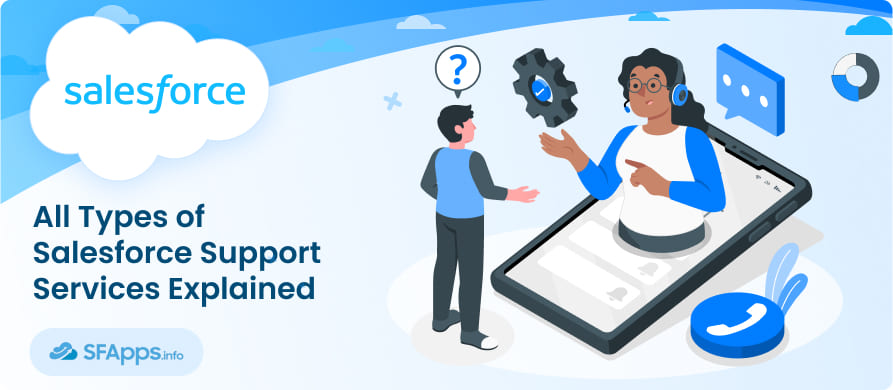
Understanding Support Services
Salesforce is a widely used Customer Relationship Management (CRM) system, helping over 150,000 companies manage customer data, sales, and communication. It needs regular assistance to work well and stay secure.
74% of businesses say CRM software has improved their access to customer data, making it easier to track sales, understand customers, and provide better solutions. The demand for CRM is growing – by 2025, the industry is expected to be worth over $80 billion. These numbers show how important these systems are today.
More companies use this CRM in their daily work. It helps them stay organized, improve customer relationships, and increase sales. As technology improves, it is getting smarter, with automation and AI tools that save time and reduce manual work. But to take full advantage of these features, businesses need proper help. Without it, they may face system issues, security risks, or missed opportunities.
Salesforce support service helps fix problems, set up new features, and keep everything running well. In this guide, we’ll go through the different types of help and how they can help businesses succeed.
Types of Salesforce CRM Support
Businesses can use various options to maximize their investment in CRM. Each option plays a unique role in improving operations and achieving goals. This guidance helps resolve issues, maintain the system, connect with other software, and manage daily tasks. A SF support specialist can guide companies in using these resources effectively. With the right help, organizations can keep their CRM running well, secure their data, and ensure teams have the tools they need to succeed.

Technical Salesforce Support
Tech assistance is crucial for resolving issues and maintaining the system. This helps businesses troubleshoot problems, fix errors, and ensure that the software works properly. Whether it’s a minor glitch or a major system failure, having access to this help allows companies to address issues quickly and keep their operations running without interruptions. A Salesforce technical support engineer can assist in diagnosing problems and implementing solutions, minimizing downtime and disruptions. With reliable technical help, organizations can focus on their core activities while knowing that help is available when needed.
Managed Support Services
Managed assistance offers a complete solution, where a team of experts looks after the CRM environment for the business. This includes monitoring the system, performing regular updates, and applying best practices for effective use. With managed help, companies can focus on their main business activities while specialists handle technical details and ensure everything is working well. These experts can also provide useful insights and suggestions to improve system performance. By choosing managed Salesforce support services, organizations can save time, reduce stress, and improve their overall operations.
Salesforce Integration Services
Integration solutions are important for businesses that use different software systems. This type of assistance helps connect CRM with other applications, such as marketing tools, accounting software, or e-commerce platforms. By integrating these systems, companies can simplify their processes and improve data sharing, allowing for better decision-making. This connection gives businesses a clear view of their operations and helps them respond quickly to changes. Proper integration ensures that all systems work together well, reducing the chances of errors and saving time. By using Salesforce integration service, organizations can improve collaboration and get the most out of their software tools.
Salesforce Administration Services
Admin guidance focuses on the daily Salesforce management. This includes tasks like user management, data maintenance, and report generation. This helps to ensure that the system is used properly and that users have the access and assistance they need. With dedicated admin help, businesses can encourage more users to engage with the system and make informed decisions based on accurate information. This assistance also allows companies to manage user permissions effectively and maintain the quality of their data. By utilizing Salesforce administration support, organizations can keep their CRM running well and get the most value from their investment.
Insight:
Collaborating with experts who understand Salesforce can improve how a company uses the platform. These professionals can quickly identify and fix issues, often faster than an in-house team can. Their knowledge allows businesses to concentrate on their core activities while letting the specialists handle the technical challenges.
Types of Professionals Providing Salesforce Support
Many professionals play important roles in providing effective CRM assistance. Each person has unique skills and expertise to help businesses get the most from the platform and ensure that it meets their needs. The team is made up of different experts who work together to provide complete help. They answer user questions, manage system updates, and make sure everything works well. This team offers SF solutions, handling a variety of needs, from simple questions to more complex issues. With their range of skills and experience, they create a positive experience for all users and help businesses get the most from their system. Here are the key roles involved in the assistance:
- Administrator: An admin manages the day-to-day tasks within the system. They handle user permissions, maintain data quality, and generate reports that help businesses make informed decisions. Their role is crucial for ensuring that the system is organized and secure, allowing users to access the information they need to perform their jobs efficiently.
- Developer: Play a crucial role in creating and customizing applications on the platform. They write code to build new features and improve existing ones, making sure that the software meets the specific needs of the business. Developers work closely with other team members to understand what the users require. They also test their work to ensure it functions properly and is user-friendly.
- Consultant: A consultant provides valuable advice on how to use the environment effectively. They analyze business processes, identify areas for improvement, and suggest practical solutions that help the organization. By working closely with businesses, they help implement changes that meet specific goals and improve overall performance.
- Salesforce Support Engineer: This person specializes in solving technical problems and helping users with any issues they may face while using the CRM. They have a deep understanding of the software and can assist with challenges, ensuring that work continues without interruptions. Their expertise is crucial for quickly fixing problems and maintaining the overall performance of the system.
- Salesforce Integration Specialist: This professional connects the environment with other software applications that businesses may use, such as marketing tools or accounting programs. They ensure that different systems work well together, allowing for easy data sharing and reducing the need for manual data entry. Their work helps improve overall productivity and accuracy in business processes.
- SF Architect: This expert designs the overall setup of the CRM within a company. They assess the organization’s needs and ensure that the system is tailored to meet those needs while integrating well with other technologies. Their careful planning and design help businesses make the best use of the system in the long run.
Types of Support Services by Engagement Models
When businesses need help with CRM, they have different options for assistance. These options can meet various needs and budgets. Each choice offers specific benefits, allowing companies to pick the best fit for their situation. By knowing these models, organizations can better use the platform and get the right help. Choosing the right model can lead to better resource management and increased user satisfaction.
On-Demand Managed Services
This option gives businesses help whenever they need it. Companies can get help for specific problems or projects as they arise. This approach works well for organizations that require quick assistance without a long-term commitment. For example, hourly Salesforce support allows businesses to pay only for the help they actually use, making it a smart way to manage costs. This flexibility lets companies address urgent issues, such as fixing a bug or completing a project, while keeping their expenses in check. With this choice, organizations can respond quickly to challenges and ensure their systems run well.
Part-Time Support Specialists
In this model, businesses hire one or more specialists who work part-time to help with the tasks. These specialists provide ongoing maintenance, handling regular maintenance, user training, and troubleshooting. This is a good fit for companies that need help consistently but don’t need someone full-time. Having a part-time specialist means organizations have access to expert help when they need it, which can improve daily work.
Dedicated Support Team
This model includes having a full team of professionals assigned to a business. They work closely with the organization to provide complete and ongoing help. Salesforce support team manages system updates, fixes problems, and makes sure everything runs well. Salesforce ongoing support services from a dedicated team can greatly improve how a company uses the platform. With a dedicated team, businesses enjoy having experts who know their setup, which leads to quicker fixes and better use of resources.
Insight:
Businesses can choose from various support options based on their needs. They can select on-demand help for urgent issues, part-time specialists for ongoing tasks, or dedicated teams for complete management.
Pricing for Service Solutions
Pricing can differ depending on the engagement model chosen by a business. Each model has its own pricing structure, offering various advantages based on what the company needs. Here are the main options and how their pricing usually works:
On-Demand Managed Services: This option charges businesses based on usage. For example, companies may pay an hourly rate for help when they need it. This means they only pay for the time they use, which is great for managing costs. The typical price for on-demand Salesforce technical support ranges from $50 to $250 per hour, according to our analysis and comparison of different service providers.
Part-Time Support Specialists: With this model, businesses hire specialists for a set number of hours each week or month. The pricing is usually based on a flat rate for the agreed hours. For example, the monthly cost of managed services can vary based on the provider and the specific packages they offer. Typically, prices can range from $1,500 to $5,000 per month (average pricing based on our review of different providers), depending on the level of support required. This option offers more predictable costs while still providing access to expert help on a regular basis.
Dedicated Support Teams: This engagement model involves hiring a full team of experts to provide ongoing help. The pricing is typically based on a monthly or yearly fee. This can range from $5,000 to $15,000 per month, making it a more cost-effective choice for larger businesses that need consistent assistance. When compared to hiring two part-time specialists, dedicated teams can offer better value for those requiring regular assistance, as they ensure quick responses and comprehensive solutions.
How to Choose the Best Model for Your Business
Salesforce ticket support can be a great option for businesses that need help occasionally. Companies with rare issues may find on-demand services more cost-effective, while those needing regular assistance may benefit from part-time specialists or a dedicated team. The best assistance model depends on your business needs, budget, and how often you require help. Understanding these options will help you choose the right solution.
Below is a comparison of the main engagement models, including key factors such as cost, availability, and best use cases.
| Comparison of the Main Engagement Models | |||
|---|---|---|---|
| Model | Description | Advantages | Disadvantages |
| On-Demand Managed Services | Help is provided when needed, usually on an hourly basis. | No need to manage a team – no HR or administrative overhead. | Costs can be high if you need a lot of hours. |
| Part-Time Support Specialists | Specialists work a set number of hours per week or month. | You pay for the hours you need and get expert help when required. | Limited availability, may not cover urgent issues. |
| Dedicated Support Teams | A full team provides ongoing service for a monthly fee. | Full understanding of your business, working as an extension of your in-house development team. | Higher cost, may not be necessary for small companies. |
How to Choose Your Service Provider
Choosing the right company for the assistance is important to keep your system running effectively. A good provider can help solve problems quickly, improve workflows, and ensure your business gets the most out of the platform. If you decide to hire Salesforce support and maintenance experts, here are some key things to think about when making your choice:
1. Experience and Expertise
Select a provider with a strong background in CRM maintenance. Look for companies that have worked with various industries and know how to handle different Salesforce issues. More experience means better solutions for your business.
2. Support Availability
Think about when you need help. Some businesses require assistance 24/7, while others may only need it during regular working hours. Ensure the provider’s availability matches your needs so you can get assistance when necessary.
3. Pricing and Engagement Models
Compare different pricing plans and models. Some companies charge by the hour, while others offer ongoing help for a fixed monthly fee. If you want to save money but still get expert help, nearshore Salesforce support services can be a great option. They provide professional help from nearby countries, often at lower costs than hiring locally.
4. Response Time and Service Quality
Fast response times are important. If something goes wrong with your system, you need quick maintenance to prevent business interruptions. Ask the provider how fast they respond to issues and how they ensure high-quality assistance.
5. Customer Reviews and References
Check online reviews and ask for feedback from past clients. A reliable company will have positive customer experiences. If possible, talk to businesses that have used their services before to see if they were satisfied.
6. Security and Compliance
Salesforce stores important business data, so security is a big concern. Make sure the provider follows strict security measures and meets all necessary compliance standards. This is especially important for businesses that handle sensitive customer information.
FAQs on Support Services
This section provides answers to frequently asked questions about assistance options for businesses. It offers explanations to help you understand your choices and make better decisions.
1. How do I know if I need ongoing help?
If your business frequently encounters problems or requires regular updates and maintenance, ongoing help might be beneficial. Consider how often you find yourself needing assistance or how quickly issues arise when making your choice.
2. What are the benefits of hiring a provider?
Hiring a provider can save valuable time and ensure that your system operates efficiently. With their expertise, they can quickly address and resolve issues, allowing you to concentrate on running your business without disruptions.
3. Can I choose how much help I need?
Yes, many companies offer flexible options tailored to your needs. You can select a plan that aligns with your requirements, whether that means occasional assistance for specific issues or more frequent assistance to handle ongoing tasks.
4. How do I choose the right provider?
When selecting a provider, look for one that has relevant experience and positive feedback from other clients. A pricing model that fits your budget is essential as well. Additionally, consider their availability and how responsive they are to inquiries or issues.
5. How can nearby support services help my business?
Nearby assistance can provide professional assistance from countries that are close to your own, often at more affordable rates. This can help strike a balance between receiving quality help and managing costs effectively, making it a smart choice for many businesses.
Conclusion
Choosing the right help for your business is very important. Knowing the different options, like on-demand help, part-time workers, or a full team, can help you make a smart choice that fits your needs and budget. Each option has its own benefits, whether you need help now and then or regular support.
Think about what you need for your business to run well. Look for a provider that has the right experience and pricing to match your requirements. Making the right choice will not only help your business run better but also help its growth in the long run.

Antonina is a Salesforce Admin with five certifications: Salesforce Associate, Salesforce Admin, Salesforce Advanced Admin, AI Associate, and AI Specialist. She started working with Salesforce in 2021 as Intern Salesforce Developer. Now, a 2-Star Ranger on Trailhead, she continues to expand her skills and knowledge. She helps manage Salesforce systems, automate tasks, and improve processes. Antonina loves learning new things and exploring better ways to use technology. In her free time, she enjoys reading, playing sports, and exploring new tech ideas.


 Previous Post
Previous Post Next Post
Next Post